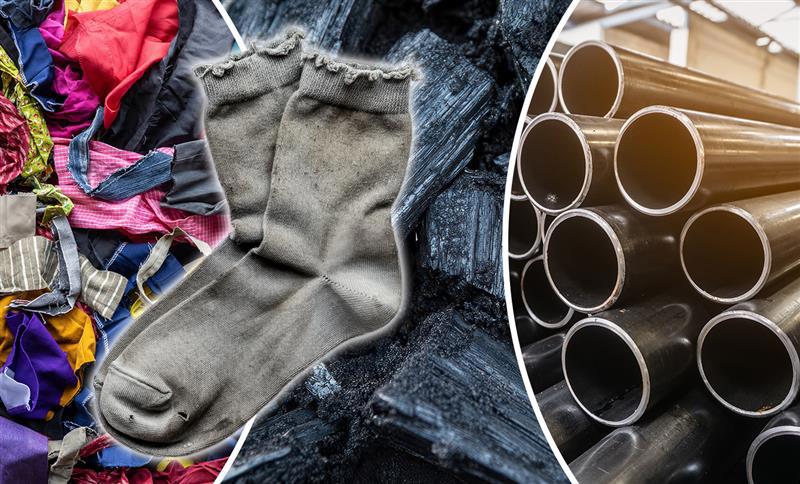Old socks to become biochar in the steel industry
2025-05-15

The majority of our textile waste has historically been incinerated instead of being reused or recycled. In the textile flows, there is always low-value, tattered material that Swedish municipalities now receive many questions about: What should we do with our old socks?
Today, this type of material comes in as a fraction that overburdens the sorting systems without generating any benefit. By sorting out the worst material, converting it into biochar, and using it in industrial processes, the project hopes to create new types of raw material for the steel industry.
"The project aims to make use of 'the worst material' and combines technical innovation with policy development to circulate material between industries," said Birgitta Losman, project manager at the University of Borås.
Connecting industries
The project was initiated by actors from the Swedish textile and steel industry jointly, and involves parties throughout the whole value chain:
- The municipal company Borås Energi & Miljö will sort out about 100 kg of rags from its pilot plant for textile sorting in Borås.
- The material is then sent to the Research Institute of Sweden’s (RISE) test and demo environment in Piteå, where the textile waste is converted into biochar through so-called slow pyrolysis (in pyrolysis, the organic material is broken down in an inert atmosphere at temperatures around 500–800 °C.)
- The product – biochar – is delivered to the metal powder manufacturer Höganäs AB, where it is evaluated as a possible reducing agent to produce sponge iron. Biochar is an important part of the company's work to phase out fossil raw materials.
- Fashion company Kappahl is the initiator of the project and contributes material knowledge as the initial producer in the value chain.
"For us as a brand, this is an important innovation project to ensure that the upcoming extended producer responsibility (EPR) for textiles creates environmental benefits," said Sandra Roos, Vice President of Sustainability at Kappahl Group.
Biochar replaces fossil materials
According to the Swedish Environmental Research Institute (IVL), about 3 million tonnes of fossil coal are used in Sweden every year, of which about 70 percent goes to iron and steel production. Finding new raw materials based on waste streams for sustainable production of biochar is an opportunity to both create great climate benefits and improve resource utilisation in society while also increasing the availability of biochar at an attractive price, according to Pontus Hydén, Technical Expert at Höganäs AB.
"This project is exciting as it creates collaboration between two industries that normally do not have much exchange of material streams," said Pontus Hydén.
At RISE in Piteå, there are flexible test beds for the pyrolysis process that will transform the waste textile into biochar.
"In the project, we contribute to the circular transition by converting textile waste into usable products," said Ann-Christine Johansson, researcher at RISE.
Will help municipalities – and residents
Science Park Borås will coordinate the project and contribute with policy development at local and national level for material circulation. The project is also linked to the University of Borås's national work with the government assignment Textile & Fashion 2030 and the innovation project System Demonstrator for a Sustainable Textile System.
"We hope that the project will give us experience and knowledge in both technical innovation and policy issues, which in the long run will support the municipalities in their task of collecting and circulating textile waste," said Birgitta Losman.
At Borås Energi & Miljö, which recently started up its pilot plant for textile sorting in Borås, they hope above all to be able to give residents an answer to their eternal question.
"Everyone is wondering what to do with their old socks – soon we may be able to tell them to sort them correctly so that they can become steel," said Felicia Fernstedt at Borås Energi & Miljö.
About the project
The project "Old socks become biochar in the steel industry" at Science Park Borås at the University of Borås intends to carry out real-world tests to highlight how Sweden’s recently implemented regulation on municipal responsibility for textile waste collection can be used in combination with groundbreaking technology. This technology means that waste textiles are converted into biochar through pyrolysis for the steel industry's needs. This provides context for the broader regulatory environment, which is currently undergoing rapid change.
To the project's website at Science Park Borås (in Swedish)
Project partners:
Borås Energi & Miljö AB
Höganäs AB
Kappahl AB
RISE Research Institutes of Sweden AB
The project runs from April 2025 to April 2026 and is funded by Vinnova.
Christian Naumanen
Adobe Stock

